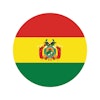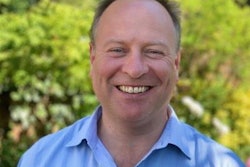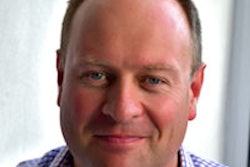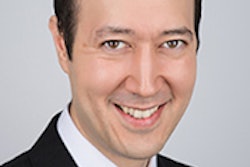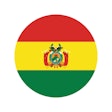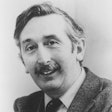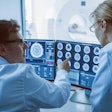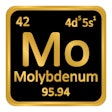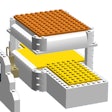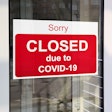
Radiologists used to be gatekeepers. When I was in short medical trousers, each hospital had one CT and one MRI scanner if it were lucky. Getting a scan was near impossible. Getting an urgent scan was laughable. We joked that the urgent scan requests had to be signed in blood of the requesting doctor.
A wise radiologist told me 90% of the job at that time was "sitting in the dark, telling people to 'eff off." While only partially true, it was a necessity. On a good day, we would scan 15 patients. CT scanners were slower than MRI is now. MRI was so slow that patients could develop metastatic disease during the scan.
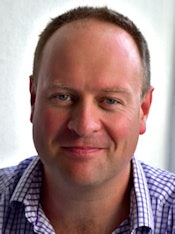 Dr. Paul McCoubrie is a consultant radiologist at Southmead Hospital in Bristol, U.K.
Dr. Paul McCoubrie is a consultant radiologist at Southmead Hospital in Bristol, U.K.
One of my old bosses was known hospital-wide as "Dr. No." It wasn't that she was an evil mastermind or had a rubber arm or anything. She would simply fix the quivering junior doctor with an unblinking stare, say a firm "No," and that was that. No other words were necessary. Moments later the request form fell in shreds into the dustbin, providing the cue for the requesting doctor to exit apologetically.
This gatekeeping role has virtually evaporated in the U.K. The investigational chocolate box is wide open. Clinicians can help themselves to as many scans as they like, as often as they like. Radiologists rarely refuse. It actually takes longer to say no to a scan than do it. Which is all manner of wrong, of course.
Some people say that better access to scans meets an unmet clinical need. Doing more scans is, therefore, better clinical practice. However, I cannot shake the feeling that we are doing more and more scans and finding less and less. Pretest probability means absolutely nothing in modern clinical practice. Our glorious diagnostic service is rapidly becoming a screening service.
As a result, U.K. radiology is currently in a dark place. While demand and expectations have soared, numbers of radiologists and funding haven't, leading to the current ungodly mess. And, because fairy godmothers don't exist, we've somehow got to sort it out.
I would advocate that we need to all become a little more "Dr. No." We need the wisdom to distinguish clinical demand from clinical need. We need the senses to recognize bovine excrement. We need the conviction to denounce it. Admittedly this flies in the face of modern sociomedical trends where medical paternalism is frowned upon. But sometimes radiologists do know best.
Radiologists need to regain a little fire in their bellies. We should be bold and decisive, borderline unreasonable. As George Bernard Shaw said, "The reasonable man adapts himself to the world; the unreasonable one persists in trying to adapt the world to himself. Therefore, all progress depends on the unreasonable man."
"But how?" I hear you cry. Well, the easiest tactic is just to withdraw scans that are a waste of time. We've recently stopped offering CT of the abdomen for unprovoked venous thromboembolism. I heard of a place that doesn't do knee MRIs in patients in the over 50s. Simple stuff. No discussion. Just a firm party line.
This fight cannot be won by policies and protocols alone. There will always be personal interactions between radiologist and clinician. And there, I argue, it is beneficial to be borderline unreasonable. Unreasonable, yes, but at least civil, preferably polite and ideally friendly. Radiologists across the U.K. have a reputation of being rude, dismissive, and aggressive, particularly to junior doctors. It is understandable; radiologists are under intolerable pressure and lack any semblance of support.
We aren't all rude but we aren't always as polite as we could be. Workplace incivility creates a toxic atmosphere that demotivates and distresses. The modern National Health Service is an uncomfortable bed without us soiling the sheets. Furthermore, venting anger is counterproductive -- it fuels aggression rather than dissipating it. Research shows that rudeness also is associated with poor patient outcomes. It is, thus, incompatible with good quality of care. It belongs firmly on the dung heap of radiological history, next to barium enemas.
One gambit to is to employ "the paradoxical consultation." In this encounter, you disarm requesting doctors with a smile and invitation to sit, briefly listening to the history before explaining that a scan is quite unnecessary but giving them a firm plan about how to manage their patient. They leave the room happy, smiling, and grateful. You feel satisfied too. Only later do they realize that, in fact, you just told them to sod off and they thanked you for it.
So, armed with this fresh-faced and uncompromising approach, I honestly believe we can confront some of the problems in U.K. radiology. Saying "no" isn't necessarily negative.


